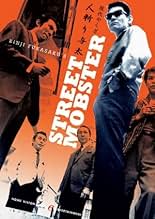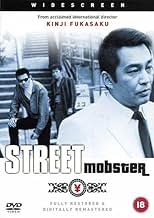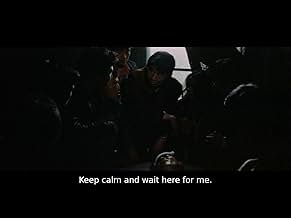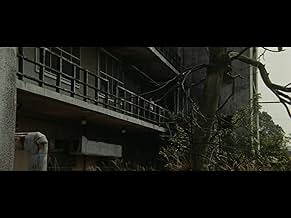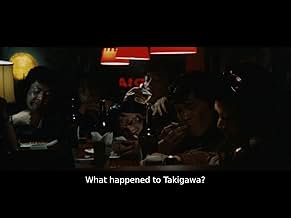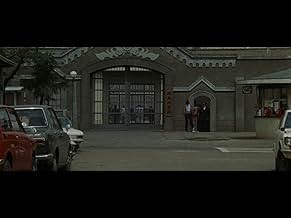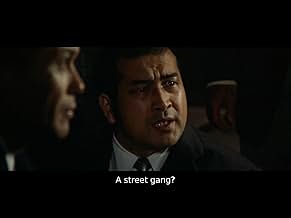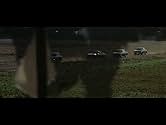NOTE IMDb
7,1/10
1,3 k
MA NOTE
Ajouter une intrigue dans votre langueA yakuza, who has an untamed rage and lack of respect for authority, finds himself leading the remnants of the gang he once belonged to in order to secure an area of their own.A yakuza, who has an untamed rage and lack of respect for authority, finds himself leading the remnants of the gang he once belonged to in order to secure an area of their own.A yakuza, who has an untamed rage and lack of respect for authority, finds himself leading the remnants of the gang he once belonged to in order to secure an area of their own.
- Réalisation
- Scénario
- Casting principal
Avis à la une
Bunta Sugawara plays a low-level criminal who keeps getting in trouble with a major yakuza clan. After a ton of screwing around with them, a second yakuza clan adopts him as one of their own. At first, everyone's happy about it, but soon enough, Sugawara feels trapped and starts to act out. This, of course, does not please his bosses. The main problem with this one is that Sugawara's character is just so unlikable - you have to wonder why the yakuza on either side keep letting him screw around so much. The mobsters from The Godfather would have whacked him instantly (especially since he's essentially a nobody; he has a few followers, but they're just punks, too). The value of the film comes from Fukasaku's direction, which seems revolutionary for 1972, almost Jason Bourne-like with hand-held cameras, thrusting the audience in the kinetic action sequences. The direction is definitely some of Fukasaku's best work.
Outlaw Killer or as it says in the film, Street Mobster, is a bloody violent look into a totally self-destructive renegade street punk that can't ever seem to back down from a fight, no matter how suicidal. Truly a hilarious, incredibly charismatic character. So funny.
The film follows him as he talks about his youth, his incarceraton and picks up with him creating a new gang. Parts are a bit too melodramatic, especially at the end, but the characters are well-crafted and the action sequences are frenetic and fun.
A unique view of yakuza and street punk life in Japan in the early '70s from crazy-guy Fukasaku, the man behind Tora! Tora! Tora! and the fantastic Battle Royale.
The film follows him as he talks about his youth, his incarceraton and picks up with him creating a new gang. Parts are a bit too melodramatic, especially at the end, but the characters are well-crafted and the action sequences are frenetic and fun.
A unique view of yakuza and street punk life in Japan in the early '70s from crazy-guy Fukasaku, the man behind Tora! Tora! Tora! and the fantastic Battle Royale.
This has a similar look to some of the early 70s New York gangster and Blaxploitation flicks, only with an eye for the big moody shadows that wouldn't be out of place in a Carol Reed movie. The acting is pretty good, even when the hero is tired and emotional, and the few characters that are fleshed out are never let down by the script. It's easy to see how Riki Takeuchi and Takashi Miike misspent their youth. I wouldn't go so far as to call it a classic, but it compares very favourably with the the best of its era.
The twang of the jaws harp and the jarring off-key harmonica are a nod in the direction of Ennio Morricone. The hyper realism (and melodrama)is very much of its day. Think of Larry Cohen, Sergio Leone, Roman Polanski, Sergio Corbucci, Sam Fuller, Sam Peckinpah, Don Siegel, and their ilk in the 60s and 70s, and accept that film has always been an international conspiracy by artists with attitude. Audiences may be isolated by language, but filmmakers are interested in the visual aspects, and they don't need translation, only an understanding of technique. Kurosawa and Mishima opened up Japanese cinema to the world, and Japanese film makers responded by drawing influences from the wider world.
This movie takes the technical influences and extrapolates them into the boom years of the Japanese economy. Where's there's money, there's organised crime. The casual unaffiliated street punk was a dying breed in the 70s. It's noticeable that the "punks" don't wear suits. They look more like refugees from the beatnik era, and the jazzy sections of the score (that accompany their drunken good times) seem to be saying that their day is done. Kinji Fukasaku is as deserving of credit as any of the aforementioned masters of pulp. His eye is true, and whenever he has a decent script, he makes a good or a great movie, usually on a tight budget. Who could ask for more?
The twang of the jaws harp and the jarring off-key harmonica are a nod in the direction of Ennio Morricone. The hyper realism (and melodrama)is very much of its day. Think of Larry Cohen, Sergio Leone, Roman Polanski, Sergio Corbucci, Sam Fuller, Sam Peckinpah, Don Siegel, and their ilk in the 60s and 70s, and accept that film has always been an international conspiracy by artists with attitude. Audiences may be isolated by language, but filmmakers are interested in the visual aspects, and they don't need translation, only an understanding of technique. Kurosawa and Mishima opened up Japanese cinema to the world, and Japanese film makers responded by drawing influences from the wider world.
This movie takes the technical influences and extrapolates them into the boom years of the Japanese economy. Where's there's money, there's organised crime. The casual unaffiliated street punk was a dying breed in the 70s. It's noticeable that the "punks" don't wear suits. They look more like refugees from the beatnik era, and the jazzy sections of the score (that accompany their drunken good times) seem to be saying that their day is done. Kinji Fukasaku is as deserving of credit as any of the aforementioned masters of pulp. His eye is true, and whenever he has a decent script, he makes a good or a great movie, usually on a tight budget. Who could ask for more?
Street Mobster is a violent Japanese gangster movie by prolific director Fukasaku Kinji who would later on direct influential genre masterpieces such as Battles Without Honor and Humanity, Graveyard of Honor and Yakuza Graveyard. Western audiences know him as the director of dystopian action thriller Battle Royale which was the last movie he was able to complete.
The story of this movie is rather simple. It follows the life of a violent gangster who attacks the members of an inflluential clan who try to extort money from him and associates. He spends some time in prison but soon forms a new gang that is particularly violent. He ultimately gets injured and is temporarily forced to join a bigger family for protection. When another and even bigger family from Osaka tries to increase its influence in Kawasaki, the film's violent antagonist decides to disrespect common conventions and brutally disrespects the different gangster families. The three involved families come to the only reasonable conclusion: they must cooperate to eliminate the antagonist and his associates to preserve peace.
The most interesting element about Street Mobster is its violent, nihilistic and egoistic antagonist who isn't interested in compromises, peace or truces. He desires to become the biggest gangster boss in the country by any means necessary. While this character is extremely dislikeable, he is brutally consequent and honest in his actions and therefore more complex and profound than one might think at first contact. The movie impresses with numerous violent scenes supported by dynamic camera work that have aged rather well and can still be considered offensive nowadays. The film has frantic pace and entertains from start to finish.
On the negative side, there are very few characters to sympathize or empathize with. As opposed to Western gangster movies, even the victims and outsiders in organized crime come off as careless and despicable. The story is also extremely thin and quite predictable. The action scenes are quite intense but also rather repetitive. The movie impresses at first contact but lacks creativity, depth and diversity.
To conclude, you should watch Street Mobster if you are looking for a particularly brutal, entertaining and fast gangster movie that has stood the test of time. This film certainly entertains while it last but doesn't leave any deeper impression due to its thin story line. Street Mobster is a feast for genre fans but can't compete with Fukasaku Kinji's later works.
The story of this movie is rather simple. It follows the life of a violent gangster who attacks the members of an inflluential clan who try to extort money from him and associates. He spends some time in prison but soon forms a new gang that is particularly violent. He ultimately gets injured and is temporarily forced to join a bigger family for protection. When another and even bigger family from Osaka tries to increase its influence in Kawasaki, the film's violent antagonist decides to disrespect common conventions and brutally disrespects the different gangster families. The three involved families come to the only reasonable conclusion: they must cooperate to eliminate the antagonist and his associates to preserve peace.
The most interesting element about Street Mobster is its violent, nihilistic and egoistic antagonist who isn't interested in compromises, peace or truces. He desires to become the biggest gangster boss in the country by any means necessary. While this character is extremely dislikeable, he is brutally consequent and honest in his actions and therefore more complex and profound than one might think at first contact. The movie impresses with numerous violent scenes supported by dynamic camera work that have aged rather well and can still be considered offensive nowadays. The film has frantic pace and entertains from start to finish.
On the negative side, there are very few characters to sympathize or empathize with. As opposed to Western gangster movies, even the victims and outsiders in organized crime come off as careless and despicable. The story is also extremely thin and quite predictable. The action scenes are quite intense but also rather repetitive. The movie impresses at first contact but lacks creativity, depth and diversity.
To conclude, you should watch Street Mobster if you are looking for a particularly brutal, entertaining and fast gangster movie that has stood the test of time. This film certainly entertains while it last but doesn't leave any deeper impression due to its thin story line. Street Mobster is a feast for genre fans but can't compete with Fukasaku Kinji's later works.
"Street Mobster" is part of the early 70's crop of Japanese yakuza films that were spearheaded by Kinji Fukasaku, who is once again behind the helm without missing a beat. All the mandatory elements that make a yakuza film work are present: forming and switching of alliances between yakuza families, fistfights, stabbings, a guerilla view of Tokyo, frenetic action sequences, sleaze. But whereas a lesser, more workmanlike director would work these things from a checklist, Fukasaku instills so much energy that even the most rudimentary of things are a pleasure to watch.
Indeed "Street Mobster" is packed full of raw, animalistic energy that more than makes up for the fairly predictable nature of the story. In typical yakuza fashion, yakuza gets out of prison after doing time for a hit, forms a small gang, takes on the bigger families, carnage ensues. It's all part of what makes the genre such pure, unadulterated fun though. However all these typical genre staples take a wildly exhilarating life of their own through Fukasaku's hyperkinetic and gritty style. There's no glamour or glory to be found in Fukasaku's violence: only brutality. Stylization is kept to a bare minimum with lots of hand-held shots and cameras constantly on the move that blend in with the action. The same guerilla tactics are used for the exterior shots that capture the seedy, downtrodden side of a Tokyo full of possibilities. Dilapidated warehouses, cheap bath houses, dark rooms, dim-lit diners, rundown neighborhoods with wooden cabins, again there's no glitz or neon lights shining in Fukasaku's yakuza universe.
Regular collaborator Bunta Sugawara takes on the role of the titular Street Mobster, but gone is his cool (and sullen) demeanor from other yakuza films. He's responsible for some serious scenery consumption, wildly overacting, often approaching even Kikuchiyo territory (Mifune's character from Seven Samurai) but with the same honest, natural approach that made him the great actor that he was. He's also one of the best physical actors I've seen and you can see it paying off in dividends with every fight scene he gets involved with (and there are lots, don't worry).
If you'd like to see a different kind of gangster film, one that relies more on viscera, grittiness and raw energy than faux glamour and hip mafiosos, you should definitely invest in Street Mobster. It's pulpy, fast-paced and balls-out. 70's Japanese action cinema in top form
Indeed "Street Mobster" is packed full of raw, animalistic energy that more than makes up for the fairly predictable nature of the story. In typical yakuza fashion, yakuza gets out of prison after doing time for a hit, forms a small gang, takes on the bigger families, carnage ensues. It's all part of what makes the genre such pure, unadulterated fun though. However all these typical genre staples take a wildly exhilarating life of their own through Fukasaku's hyperkinetic and gritty style. There's no glamour or glory to be found in Fukasaku's violence: only brutality. Stylization is kept to a bare minimum with lots of hand-held shots and cameras constantly on the move that blend in with the action. The same guerilla tactics are used for the exterior shots that capture the seedy, downtrodden side of a Tokyo full of possibilities. Dilapidated warehouses, cheap bath houses, dark rooms, dim-lit diners, rundown neighborhoods with wooden cabins, again there's no glitz or neon lights shining in Fukasaku's yakuza universe.
Regular collaborator Bunta Sugawara takes on the role of the titular Street Mobster, but gone is his cool (and sullen) demeanor from other yakuza films. He's responsible for some serious scenery consumption, wildly overacting, often approaching even Kikuchiyo territory (Mifune's character from Seven Samurai) but with the same honest, natural approach that made him the great actor that he was. He's also one of the best physical actors I've seen and you can see it paying off in dividends with every fight scene he gets involved with (and there are lots, don't worry).
If you'd like to see a different kind of gangster film, one that relies more on viscera, grittiness and raw energy than faux glamour and hip mafiosos, you should definitely invest in Street Mobster. It's pulpy, fast-paced and balls-out. 70's Japanese action cinema in top form
Le saviez-vous
- ConnexionsFeatured in Yakuza Eiga, une histoire du cinéma yakuza (2009)
Meilleurs choix
Connectez-vous pour évaluer et suivre la liste de favoris afin de recevoir des recommandations personnalisées
Détails
Contribuer à cette page
Suggérer une modification ou ajouter du contenu manquant

